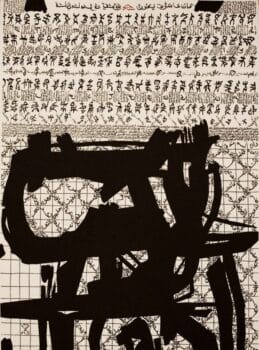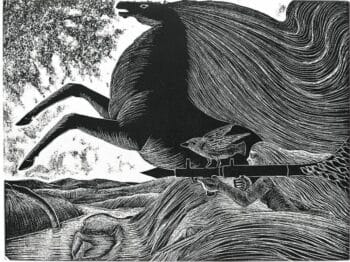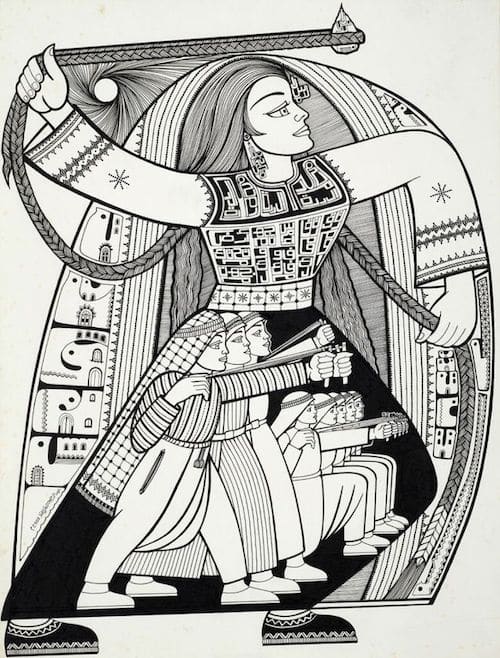Dear friends,
Greetings from the desk of Tricontinental: Institute for Social Research.

Rachid Koraïchi (Algeria) and Hassan Massoudy (Iraq), A Nation in Exile, 1981.
Israel calls its latest military campaign Operation Break the Wave, a lyrical description of a brutal reality. This year, 2023, will be the seventy-fifth year after the Nakba, the catastrophe of 1948 when Israeli troops illegally removed Palestinians from their homes and tried to erase Palestine from the map. Since then, Palestinians have resisted against all odds, despite Israel’s formidable backing by the most powerful countries in the world, led by the United States.
Operation Break the Wave started in February 2022 with the assassination of three Palestinians in Nablus (Adham Mabrouka, Ashraf Mubaslat, and Mohammad Dakhil) and continued with terrible violence along the spine of the West Bank, spreading into brutalised Gaza. On 26 January 2023, Israeli forces killed ten Palestinians—including an elderly woman—in Jenin and in al-Ram, north of Jerusalem, and then shot at an ambulance to prevent it from assisting the injured—a clear war crime. The Jenin massacre provoked rocket fire from Palestinian resistance forces in Gaza, to which the Israeli Air Force responded disproportionately, shooting at the densely populated al-Maghazi refugee camp in the centre of Gaza. The cycle of violence continued with a lone Palestinian gunman killing seven Israelis in the illegal settlement of Neve Yaakov in East Jerusalem. In reaction to that, the Israeli government has put in place ‘collective punishment’ systems—a violation of the Geneva Conventions—which allows the state to target the gunman’s family members, and the Israeli government will make it easier for Israelis to carry firearms.
The Israeli government launched Operation Break the Wave in response to habbat sha’biyya (‘popular uprisings’) that have begun again across Palestine and express the frustration generated by Israeli pressure campaigns and the near collapse of economic life. Some of these uprisings took place not only in the West Bank, East Jerusalem, and Gaza where they are more common, but amongst Palestinians living inside the 1948 Green Line of Israel. In May 2021, these protestors gathered under The Dignity and Hope Manifesto and called for new agitations, a ‘united Intifada’ which unites Palestinians in exile, inside Israel, and in the Occupied Territories. These moves and the gains of Palestinians in the United Nations system indicate a new dynamism within Palestinian politics. Most recently, on 31 December 2022, the UN General Assembly voted 87 to 26 to ask the International Court of Justice to provide an opinion on Israel’s ‘prolonged occupation, settlement, and annexation of Palestinian territory’. The new phase of Israeli violence against Palestinians is a reaction to their achievements.

Mustafa al-Hallaj (Palestine), The Battle of Al-Karameh, 1969.
In the midst of all this, the Israeli people voted Benjamin Netanyahu into office to form his sixth government since 1996. Already, Netanyahu has been Israel’s prime minister for over fifteen of the past twenty-seven years, as he heads into another seven-year term. His government is fiercely far-right, although from the standpoint of the Palestinians there is steady continuity in Zionist state policy, whether the government is led by the far-right or by less right-wing sections. On 28 December 2022, Netanyahu defined his government’s mission with clarity: ‘The Jewish people have an exclusive and unquestionable right to all areas of the Land of Israel. The government will promote and develop settlement in all parts of the Land of Israel—in the Galilee, the Negev, the Golan, Judea, and Samaria’.
Netanyahu’s maximalist standard—that the Jewish people, not just the Zionist state, have the right to the land between the Jordan River and the Mediterranean Sea—is not something that has appeared precipitously in this government’s statements. It is rooted in Israel’s Basic Law (2018), which says, ‘The land of Israel is the historical homeland of the Jewish people, in which the State of Israel was established’. This legal manoeuvre established Israel as the land of Jewish people, not a multinational or multi-ethnic territory. Furthermore, every administrative definition of the ‘State of Israel’ asserts its control over the entire territory. For example, Israel’s Central Bureau of Statistics has, since at least 1967, inaccurately counted any Israeli living to the west of the Jordan River, even in the West Bank, as an Israeli, and official Israeli maps show none of the internal divisions produced by the 1993 Oslo Accords.
Israeli state policy, rooted in a settler-colonial mentality, leaves no room for a Palestinian state. Gaza is throttled, the Bedouins in an-Naqab are being displaced, Palestinians in East Jerusalem are being evicted, and illegal Israeli settlements in the West Bank are growing like a plague of locusts. Netanyahu’s governmental partner Otzma Yehudit (‘Jewish Strength’) is willing to conduct Palestinicide in order to create a Jewish-only society in the Levant. The promise of Oslo, a two-state solution, is simply no longer factually possible as the Palestinian state is eroded and contained. The idealistic possibility of a binational state—made up of Israel and Palestine with Palestinians given full citizenship rights—is foreclosed by the Zionist insistence that Israel be a Jewish state, an ethnocentric and anti-democratic option that already treats Palestinians as second-class residents in an apartheid society. Instead, Zionism is in favour of a ‘three-state solution’, namely expelling Palestinians to Egypt, Jordan, and Lebanon.

Malak Mattar (Palestine), You and I, 2021.
In 2016, the United States and Israel signed their third ten-year Memorandum of Understanding on military aid, which runs from 2019 to 2028, and under which the U.S. promises to provide Israel with $38 billion for military equipment. This aid is unconditional: nothing in the agreement prevents Israel from using the equipment to violate international law, kill U.S. citizens (as it killed Shireen Abu Akleh, a reporter), or destroy humanitarian projects funded by the U.S. government. Rather than mildly rebuke Israel for its ethnocidal policies, U.S. President Joe Biden welcomed Benjamin Netanyahu, his ‘friend for decades’, to assist the U.S. in confronting illusionary ‘threats from Iran’. Furthermore, just after Netanyahu’s government deepened Operation Break the Wave, the U.S. military arrived in Israel in force to conduct a joint military exercise called Juniper Oak, the ‘largest and most significant exercise we have engaged in’, according to Pentagon Press Secretary Air Force Brigadier General Pat Ryder. Backed to the hilt by the U.S. and nonchalant about condemnation from international bodies, the Israeli state continues its fatal project to erase Palestine.
Maya Abu al-Hayyat, a Palestinian poet living in Jerusalem, wrote a beautiful poem called ‘Daydream’, which settles into a rhythm of Palestinian life and geography defined by little towns in the West Bank. There are children playing, women dancing, life where life is denied by an occupation that has lasted for generations and generations, where the screams of the occupied mimic the loud alarm of the Palestine Sunbird, the national bird.
I’ll write about a joy that invades Jenin from six directions,
about children running while holding balloons in Am’ari Camp,
about a fullness that quiets breastfeeding babies all night in Askar,
about a little sea we can stroll up and down in Tulkarem,
about eyes that stare in people’s faces in Balata,
about a woman dancing
for people in line at the checkpoint in Qalandia,
about stitches in the sides of laughing men in Azzoun,
about you and me
stuffing our pockets with seashells and madness
and building a city.
My pockets are filled with rage and hope, an expectation that our struggles of solidarity alongside the Palestinian people will prevail, because the ‘process of liberation is irresistible and irreversible’.
Warmly,
Vijay

